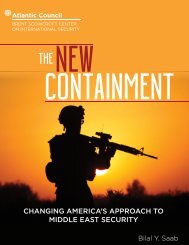POLITICS GOVERNANCE STATE-SOCIETY RELATIONS
Politics_Governance_and_State-Society_Relations_web_1121
Politics_Governance_and_State-Society_Relations_web_1121
You also want an ePaper? Increase the reach of your titles
YUMPU automatically turns print PDFs into web optimized ePapers that Google loves.
<strong>POLITICS</strong>, <strong>GOVERNANCE</strong>, AND <strong>STATE</strong>-<strong>SOCIETY</strong> <strong>RELATIONS</strong><br />
IV. RECOMMENDATIONS FOR US POLICY<br />
Over the past four years, US policy toward<br />
questions of domestic governance in the Middle<br />
East has swung dramatically between overinvolvement<br />
and under-involvement—and at<br />
both ends of this policy pendulum, officials have<br />
found themselves frustrated at the results. The<br />
administration of Barack Obama entered office<br />
determined to learn the lessons of the Iraq War<br />
and avoid overestimating the United States’ ability<br />
to shape, or rebuild, society and politics in far-off<br />
lands. And yet, the administration has perhaps<br />
learned this lesson too well, as it now declaims<br />
any ability to influence outcomes of the wrenching<br />
political change underway in the Middle East.<br />
While the United States certainly cannot determine<br />
outcomes in the region, its presence and influence is<br />
still sizeable, indeed unmatched for an actor outside<br />
the region. The United States is still the largest<br />
financial donor to Middle Eastern governments, for<br />
both economic and military purposes. It is still the<br />
dominant military power in the region. Its globally<br />
dominant economic power shapes the markets<br />
in which Arab economies compete, as well as the<br />
products and services and cultural content Arabs<br />
consume. Indeed, from the perspective of Arab<br />
citizens living in Cairo or Amman, the notion that<br />
the United States lacks influence over their lives<br />
is laughable—American policy, economics, and<br />
culture are constant, ever-present forces in their<br />
daily experience and in their governments’ choices.<br />
At the same time, Americans have a particular<br />
case of whiplash about governance in the Middle<br />
East: all the optimism they experienced at popular<br />
pro-democracy mobilization in 2011 has turned to<br />
dismay and worry at the metastasizing violence<br />
that characterizes the region today. Successive<br />
US administrations relied on Arab autocrats for<br />
security and diplomatic cooperation over many<br />
decades; today, the Obama administration is hard<br />
pressed to find interlocutors with the capacity<br />
and shared priorities to help Washington combat<br />
urgent security threats, stem regional violence,<br />
and stabilize regional affairs. And there is also a<br />
large gap between American and Arab policies—<br />
disagreements over how the regional order<br />
collapsed and how best to rebuild it. Western<br />
governments are fixated on ISIS and other jihadist<br />
movements across the region, and the terrorist<br />
threat they present to Western targets. Arab<br />
governments, for the most part, are focused on<br />
their own power competition with Iran, and on<br />
efforts to establish a political order in the area<br />
that will protect their interests and preferences.<br />
Regional governments are not prioritizing the ISIS<br />
threat, and their sectarian appeals may even be<br />
exacerbating it.<br />
Given all of this, in addition to the legacy of the<br />
Iraq War, many American policy makers today<br />
observe the existential challenges facing the<br />
region’s governments and conclude that American<br />
leverage to shape the region’s trajectory is limited.<br />
It is, indeed, limited—external influence always is,<br />
after all—but it is not zero. More than anything,<br />
the United States’ global and regional leadership<br />
enable it to shape the environment within which<br />
Middle Eastern actors make decisions about how<br />
to behave. The question for American policy<br />
makers is how the country can play its limited role<br />
in a way that maximally supports progress toward<br />
sustainable governance—and therefore toward<br />
stability—in the region.<br />
While perhaps slow to react to the Arab uprisings,<br />
President Obama in May 2011 laid out a bold vision<br />
that political and economic reform was the only<br />
path to renewed stability in the region, and that<br />
set democratic change across the region as a top<br />
priority for American policy. 45 After September<br />
2012, when a vicious attack on the US diplomatic<br />
mission in Benghazi led to the deaths of four<br />
Americans, the administration began to turn away<br />
from those commitments, declaring that it could<br />
not determine outcomes, and resigning itself<br />
to limiting its exposure and protecting narrow,<br />
short-term interests: limiting engagement with<br />
Libya’s post-Qaddafi government, avoiding any<br />
involvement in Syria’s civil conflict, and restoring<br />
45 “Remarks by the President on the Middle East and North<br />
Africa,” May 19, 2011, https://www.whitehouse.gov/the-pressoffice/2011/05/19/remarks-president-middle-east-and-northafrica.<br />
ATLANTIC COUNCIL<br />
33



